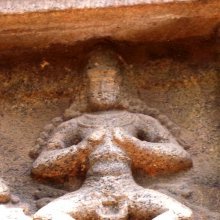Transition: 1 definition
Introduction:
Transition means something in Hinduism, Sanskrit. If you want to know the exact meaning, history, etymology or English translation of this term then check out the descriptions on this page. Add your comment or reference to a book if you want to contribute to this summary article.
Images (photo gallery)
In Hinduism
Yoga (school of philosophy)
Source: ORA: Amanaska (king of all yogas): A Critical Edition and Annotated Translation by Jason BirchTransition (to the no-mind state) is denoted by the Sanskrit term Saṅkrama, according to the Amanaska Yoga treatise dealing with meditation, absorption, yogic powers and liberation.—Accordingly, as Īśvara says to Vāmadeva: “[...] There is no transition (saṅkrama) to the no-mind state because of piercing [Cakras, knots, etc.] with lower and upper Kuṇḍalinī. Simply by [constant] immersion [of the mind in the internal gaze of Śāmbhavī Mudrā], this yoga bestows the supernatural powers. [...]”.

Yoga is originally considered a branch of Hindu philosophy (astika), but both ancient and modern Yoga combine the physical, mental and spiritual. Yoga teaches various physical techniques also known as āsanas (postures), used for various purposes (eg., meditation, contemplation, relaxation).
See also (Relevant definitions)
Full-text (+67): Pratisamdhi, Sankrama, Samkramana, Samkranti, Padahinat, Svarasamkrama, Vipaksha, Samcara, Samtana, Pratisamdhana, Abhilambhana, Ekavali, Abhyaroha, Makara Sankaranti, Satva, Svarasankrama, Sanakramana, Sandhi, Sankanti, Abhisampatti.
Relevant text
Search found 109 books and stories containing Transition; (plurals include: Transitions). You can also click to the full overview containing English textual excerpts. Below are direct links for the most relevant articles:
Vinaya (3): The Cullavagga (by T. W. Rhys Davids)
Cullavagga, Khandaka 5, Chapter 3 < [Khandaka 5 - On the Daily Life of the Bhikkhus]
Bihar and Eastern Uttar Pradesh (early history) (by Prakash Narayan)
The civilization of Babylonia and Assyria (by Morris Jastrow)
Part IX < [Chapter V - The Cults And The Temples Of Babylonia And Assyria]
Part V < [Chapter V - The Cults And The Temples Of Babylonia And Assyria]
Part VI < [Chapter IV - The Gods Of Babylonia And Assyria]
Lakulisha-Pashupata (Philosophy and Practice) (by Geetika Kaw Kher)
Chapter 2 - Spread and Transition
The Spread and Transition of Lakulisa-Pasupata Order < [Chapter 2 - Spread and Transition]
Overall Structure and Methodological considerations < [Introduction]
Music and Movements in Four Quarters < [January – March, 2000]
A Rude Episode < [January – March, 2007]
Sanskrit as Official Language < [April 1965]
Vaisheshika-sutra with Commentary (by Nandalal Sinha)
Sūtra 3.2.3 (Mind is one) < [Chapter 2 - Of the Inference of Soul and Mind]
Related products



